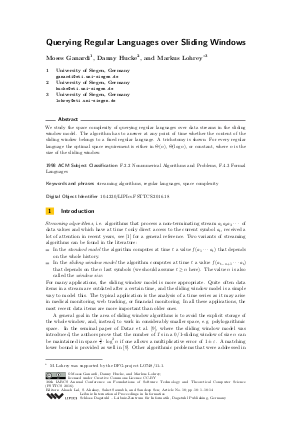Querying Regular Languages over Sliding Windows
Authors Moses Ganardi, Danny Hucke, Markus Lohrey
-
Part of:
Volume:
36th IARCS Annual Conference on Foundations of Software Technology and Theoretical Computer Science (FSTTCS 2016)
Part of: Series: Leibniz International Proceedings in Informatics (LIPIcs)
Part of: Conference: IARCS Annual Conference on Foundations of Software Technology and Theoretical Computer Science (FSTTCS) - License:
 Creative Commons Attribution 3.0 Unported license
Creative Commons Attribution 3.0 Unported license
- Publication Date: 2016-12-10
File

PDF
LIPIcs.FSTTCS.2016.18.pdf
- Filesize: 488 kB
- 14 pages
Document Identifiers
Subject Classification
Keywords
- streaming algorithms
- regular languages
- space complexity
Metrics
- Access Statistics
-
Total Accesses (updated on a weekly basis)
0PDF Downloads0Metadata Views
Abstract
We study the space complexity of querying regular languages over data streams in the sliding window model. The algorithm has to answer at any point of time whether the content of the sliding window belongs to a fixed regular language. A trichotomy is shown: For every regular language the optimal space requirement is either in Theta(n), Theta(log(n)), or constant, where $n$ is the size of the sliding window.
Cite As Get BibTex
Moses Ganardi, Danny Hucke, and Markus Lohrey. Querying Regular Languages over Sliding Windows. In 36th IARCS Annual Conference on Foundations of Software Technology and Theoretical Computer Science (FSTTCS 2016). Leibniz International Proceedings in Informatics (LIPIcs), Volume 65, pp. 18:1-18:14, Schloss Dagstuhl – Leibniz-Zentrum für Informatik (2016)
https://doi.org/10.4230/LIPIcs.FSTTCS.2016.18
BibTex
@InProceedings{ganardi_et_al:LIPIcs.FSTTCS.2016.18,
author = {Ganardi, Moses and Hucke, Danny and Lohrey, Markus},
title = {{Querying Regular Languages over Sliding Windows}},
booktitle = {36th IARCS Annual Conference on Foundations of Software Technology and Theoretical Computer Science (FSTTCS 2016)},
pages = {18:1--18:14},
series = {Leibniz International Proceedings in Informatics (LIPIcs)},
ISBN = {978-3-95977-027-9},
ISSN = {1868-8969},
year = {2016},
volume = {65},
editor = {Lal, Akash and Akshay, S. and Saurabh, Saket and Sen, Sandeep},
publisher = {Schloss Dagstuhl -- Leibniz-Zentrum f{\"u}r Informatik},
address = {Dagstuhl, Germany},
URL = {https://drops.dagstuhl.de/entities/document/10.4230/LIPIcs.FSTTCS.2016.18},
URN = {urn:nbn:de:0030-drops-68539},
doi = {10.4230/LIPIcs.FSTTCS.2016.18},
annote = {Keywords: streaming algorithms, regular languages, space complexity}
}
Author Details
References
-
Charu C. Aggarwal. Data Streams - Models and Algorithms. Springer, 2007.

-
Rajeev Alur and P. Madhusudan. Visibly pushdown languages. In Proceedings of STOC 2004, pages 202-211. ACM Press, 2004.

-
Arvind Arasu and Gurmeet Singh Manku. Approximate counts and quantiles over sliding windows. In Proceedings of PODS 2004, pages 286-296. ACM, 2004.

-
Brian Babcock, Mayur Datar, Rajeev Motwani, and Liadan O'Callaghan. Maintaining variance and k-medians over data stream windows. In Proceedings of PODS 2003, pages 234-243. ACM, 2003.

-
Ajesh Babu, Nutan Limaye, Jaikumar Radhakrishnan, and Girish Varma. Streaming algorithms for language recognition problems. Theor. Comput. Sci., 494:13-23, 2013.

-
Vladimir Braverman. Sliding window algorithms. In Encyclopedia of Algorithms, pages 2006-2011. Springer, 2016.

-
Vladimir Braverman, Rafail Ostrovsky, and Carlo Zaniolo. Optimal sampling from sliding windows. J. Comput. Syst. Sci., 78(1):260-272, 2012.

-
Michael S. Crouch, Andrew McGregor, and Daniel Stubbs. Dynamic graphs in the sliding-window model. In Proceedings of ESA 2013, volume 8125 of Lecture Notes in Computer Science, pages 337-348. Springer, 2013.

-
Mayur Datar, Aristides Gionis, Piotr Indyk, and Rajeev Motwani. Maintaining stream statistics over sliding windows. SIAM J. Comput., 31(6):1794-1813, 2002.

-
Manfred Droste, Werner Kuich, and Heiko Vogler. Handbook of Weighted Automata. Springer, 2009.

-
Gudmund Skovbjerg Frandsen, Peter Bro Miltersen, and Sven Skyum. Dynamic word problems. J. ACM, 44(2):257-271, 1997.

-
Lukasz Golab and M. Tamer Özsu. Processing sliding window multi-joins in continuous queries over data streams. In Proceedings of VLDB 2003, pages 500-511. Morgan Kaufmann, 2003.

-
Markus Holzer and Barbara König. On deterministic finite automata and syntactic monoid size. Theor. Comput. Sci., 327(3):319-347, 2004.

-
Howard Straubing. Finite Automata, Formal Logic, and Circuit Complexity. Birkhäuser, Boston, Basel, Berlin, 1994.

